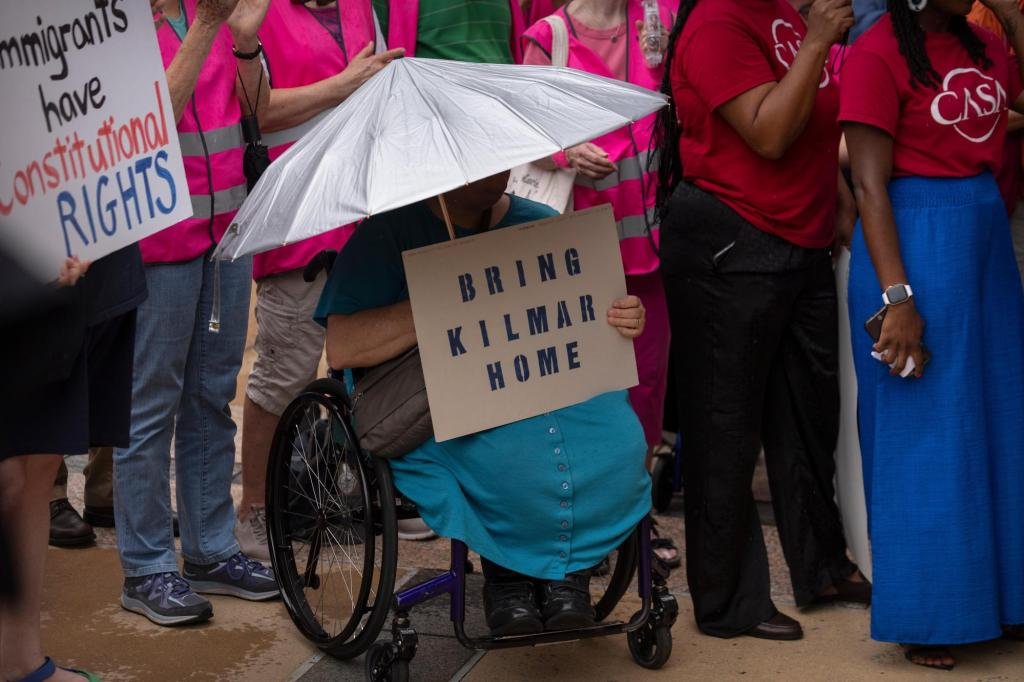Kilmar Abrego Garcia’s Legal Battle: A Deep Dive into Immigration Controversy
Kilmar Abrego Garcia, a Salvadoran national, finds himself at the center of a heated legal battle over his deportation under the Trump administration’s controversial immigration policies. U.S. District Judge Paula Xinis voiced her frustration over the government’s lack of transparency regarding Garcia’s potential deportation while he awaits trial on human smuggling charges. The case has raised significant questions about due process and the risks of being sent back to a country where Garcia might face severe threats.
The Background of Kilmar Abrego Garcia’s Case
Garcia’s situation escalated when he was wrongfully deported to El Salvador in March, violating a 2019 U.S. immigration judge’s order that protected him from deportation due to the likelihood of gang violence against him. His initial return to the U.S. came after pressure from the Supreme Court, which mandated that he be allowed to face the smuggling charges. The allegations against him relate to a 2022 traffic stop where he was driving with nine passengers, leading authorities to suspect human smuggling. Despite no formal charges or evidence linking him to the notorious MS-13 gang, the Trump administration labeled him a community threat.
Recent Court Proceedings and Government Stance
In a recent court hearing, Garcia’s attorneys sought to ensure that he is not immediately deported if released from a Tennessee jail. They requested a 72-hour hold to prevent expedited removal and potentially egregious violations of his due process rights. Judge Xinis has signaled her awareness of the case’s complexities, urging the government to clarify its deportation strategy. The Justice Department, however, remains vague about specifics, claiming options include deportation to a third country like Mexico or South Sudan, without confirming any firm decisions.
Concerns Over Transparency and Due Process
Judge Xinis criticized the government’s “utter refusal” to engage in discussions about Garcia’s situation, emphasizing the importance of transparency in such a high-profile case. She expressed concern that the administration might act without informing Garcia or his legal team, potentially leading to a swift and unjust deportation. The lack of clarity about where Garcia could be sent and what opportunity he would have to contest his removal only heightens worries about violations of his rights.
Potential Human Rights Issues in El Salvador
Garcia’s lawyers have raised serious allegations regarding his treatment during his prior deportation, claiming that he suffered beatings and psychological torture in El Salvador’s notorious prison system. Although President Nayib Bukele has denied these allegations, concerns about safety and human rights violations have cast a shadow over the administration’s plans for Garcia. The possibility of being sent to a third country that may return him to El Salvador further exacerbates fears regarding his safety.
The Broader Implications of the Case
Garcia’s plight isn’t just a legal issue; it raises broader questions about the ethics and efficacy of current immigration policies in the U.S. As his case continues to unfold, it serves as a litmus test for how the justice system balances national security concerns with the rights of individuals facing deportation. The Trump administration’s approach to immigration has been contentious, and cases like Garcia’s highlight the urgent need for a reevaluation of policies that may undermine due process.
Conclusion: The Road Ahead
As Judge Xinis prepares to issue her ruling, the legal ramifications for Kilmar Abrego Garcia remain uncertain. His case has sparked significant public interest and advocacy, with supporters rallying for his right to remain in the U.S. to face his charges without the threat of immediate deportation. This situation encapsulates the complexities of immigration law and the urgent need for transparency and accountability within the system. The outcome could influence not only Garcia’s future but also set a precedent for similar cases moving forward, reinforcing the need for fair treatment in immigration proceedings.
As this story develops, it underscores the delicate interplay between immigration enforcement, human rights, and judicial oversight—a combination that demands careful attention in the evolving landscape of U.S. immigration policy.









